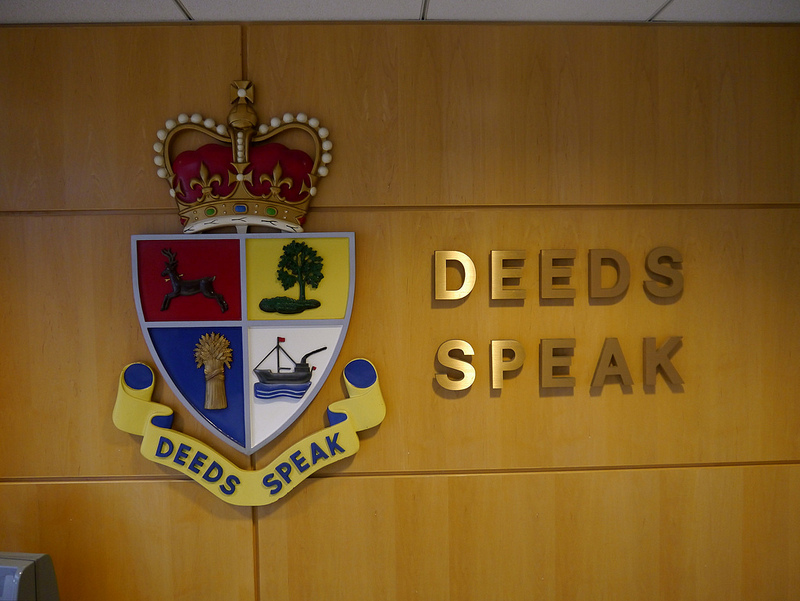A Quiet Title action is a lawsuit which a person files to establish their title against adverse claims. The plaintiff’s interest in the land can be the title to the property, an easement, a license, a lease, or title by adverse possession. Sacramento real estate attorneys often see quiet title used in situations where there is a dispute as to title and ownership in real estate. However, there is a general rule is that the holder of equitable title cannot maintain a quiet title action against the holder of legal title. This begs the question – what is the difference between legal title and equitable title?
 Legal Title
Legal Title
A shorthand way to consider it is that legal title means that you are on the deed. The term ‘legal title’ has been defined as ‘one cognizable or enforceable in a court of law, or one which is complete and perfect so far as regards the apparent right of ownership and possession, but which carries no beneficial interest in the property, another person being equitably entitled thereto; in either case, the antithesis of “equitable title.” ’ ” (Solomon v. Walton, 109 Cal.App.2d 381)
Equitable Title
Usually, a party will legitimately hold equitable title (an interest in the beneficial use of real property) while another party holds legal title only in fiduciary situations, such as custodianships, guardianships, trusteeships and security interests. A party may assume legal title of the property for a short time in order to effectuate a tax-exempt exchange. A party may be an investor, acquiring an equity interest in the property, without being conveyed legal title.
 Individuals, or entities such as title companies, may hold “bare legal title” to property for the owner of its beneficial interest. This creates a resulting trust “which arises from a transfer of property under circumstances showing that the transferee was not intended to take the beneficial interest,” and the transferee has no duty other than to deliver the property to the person entitled thereto, upon demand. (Parkmerced Co. v. City & Cty. of San Francisco (1983), 149 Cal. App. 3d 1091, 1094–95)
Individuals, or entities such as title companies, may hold “bare legal title” to property for the owner of its beneficial interest. This creates a resulting trust “which arises from a transfer of property under circumstances showing that the transferee was not intended to take the beneficial interest,” and the transferee has no duty other than to deliver the property to the person entitled thereto, upon demand. (Parkmerced Co. v. City & Cty. of San Francisco (1983), 149 Cal. App. 3d 1091, 1094–95)
The Exception – Fraud
Back to the general rule- the holder of equitable title cannot quiet title against the holder of legal title. The reason for the rule is said to be that “if the owner of equities could sue to quiet title he might obtain a judgment based upon his adversary’s fraud without setting up in his pleadings the facts constituting such fraud. This would be manifestly unfair.” The reason is that the courts require specific detailed pleadings when fraud is alleged, and the ordinary quiet title action does not include these. (Bacon v. Bacon (1937), 21 Cal. App. 2d 540, 544)
 However, there is an exception – if the legal title was acquired by fraud. In that case title may be quieted in the defrauded equitable title holder’s name and making the legal title holder the constructive trustee of the property for the benefit of the defrauded equitable titleholder. If the plaintiff properly includes the necessary factual allegations of fraud in defendant’s acquisition of title, the case falls within the exception.
However, there is an exception – if the legal title was acquired by fraud. In that case title may be quieted in the defrauded equitable title holder’s name and making the legal title holder the constructive trustee of the property for the benefit of the defrauded equitable titleholder. If the plaintiff properly includes the necessary factual allegations of fraud in defendant’s acquisition of title, the case falls within the exception.
Note that the exception only covers the situation when the defendant fraudulently obtaining title from the plaintiff, not from a third-party. The plaintiff has to be victim of the fraud in order to state a cause of action – i.e., grounds for relief from the court.
Photos:
flickr.com/photos/donbrr/4594476743/sizes/z/
flickr.com/photos/21728045@N08/9678503756/sizes/c/
flickr.com/photos/corporatemonkey/51884151/sizes/z/
 California Real Estate Lawyers Blog
California Real Estate Lawyers Blog

